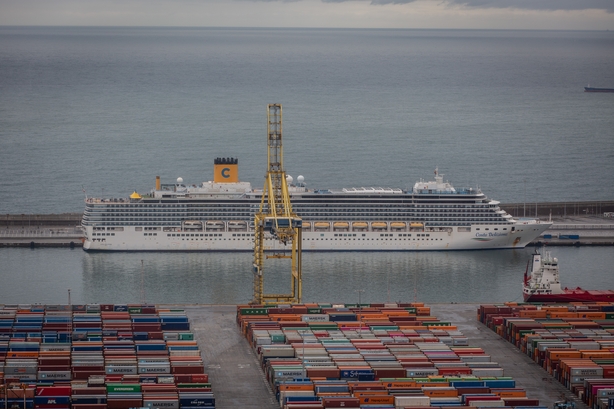There have been 2,403,410 reported COVID-19 infections around the world, from which 165,216 people have died.
That's according to an AFP tally at 1100 GMT, based on official sources.
The United States has the most deaths of any country with 40,683 fatalities.
Italy is the second hardest-hit country, with 23,660 dead. Spain follows with 20,852, then France with 19,718 and Britain with 16,060.
In Spain the daily death toll has dipped below 400 for the first time in four weeks.
Nurseries reopen in Norway
In Norway, which says it has the coronavirus under control, children are allowed to go back to nurseries from Monday, although some parents have expressed reservations over the decision. It is the first step in a slow and gradual lifting of restrictions.
Hubei high schools to reopen
High schools in the central Chinese province of Hubei, where the epidemic started, will reopen on 6 May, for final year students.
Current virus cases fall for first time in Italy
Italy has reported its first drop in the number of people currently suffering from the coronavirus since it recorded its first infection in February.
The civil protection service said 108,237 people were either being treated in hospital or were recovering at home after testing positive - down 20 from the total reported on Sunday.
"For the first time, we have seen a new positive development: the number of currently positive has declined," civil protection service chief Angelo Borrelli told reporters.
The Mediterranean country's death toll still rose by 454 to 24,114 - second only to the United Sates.
Beginning of end of lockdown
Germany has started the process of easing its lockdown, allowing some smaller shops to reopen. A ban on gatherings of more than two people remains in place as does a demand for distance of 1.5 metres in public places.
Chancellor Angela Merkel says she is "greatly concerned" the public could let its guard down too fast.
Denmark has begun to open up more businesses.
New Zealand says certain restrictions will be lifted next week: businesses deemed safe can reopen, along with some schools, while limits on local travel will also be relaxed and gatherings of up to 10 people allowed for events such as weddings or funerals.
Ghana ended a three-week lockdown on two key regions around the capital Accra and second region Kumasi.
France death toll surpasses 20,000 mark
France has announced that more than 20,000 people had now died from the coronavirus in the country after 547 new deaths, even as tentative signs grew that the epidemic was steadying.
"Tonight, our country has passed a barrier that is symbolic and particularly painful," top health official Jerome Salomon told reporters, announcing a total death toll of 20,265 people while welcoming new falls in the numbers in hospital and intensive care.
Pennsylvania Protests
Hundreds of people including lawmakers have gathered in the US state of Pennsylvania to protest measures that are urging most of the nation to stay home due to the coronavirus pandemic.
The "Patriots Rally" demonstration in state capital Harrisburg follows similar protests - cheered on by President Donald Trump - elsewhere in the United States, including in Michigan, California and Ohio.
Protesters say government regulations intended to halt the spread of COVID-19 limits individual freedoms and harms the economy.
Trucks painted with slogans including "work not welfare" and "shelter in place isn't freedom!" paraded throughout Harrisburg, as Republican representatives from Congress rallied protesters marching at the steps of the capitol building.
"Our new normal does not mean we will sacrifice our freedoms for the safety of our country," said state lawmaker Aaron Bernstine, in a speech punctuated by "USA" chants.
"Normal is not taking government handouts allowing us to pay our bills."

The US government recently began issuing one-time payments as high as $1,200 to many residents with additional supplements for children, as the fast-spreading coronavirus has left a staggering 22 million people in the US out of work.
Among Monday's protest organizers are a trio of conservative pro-gun activist brothers who have instigated anti-quarantine demonstrations throughout the country.
Second wave in Singapore
Singapore, initially successful in keeping its outbreak in check, faces a fast-moving second wave as it reports a record daily jump of more than 1,400 cases, with almost all new infections linked to dormitories housing foreign labourers.
Economic fallout
US oil prices dive to 22-year lows at just $11 after crashing almost 40% in a flooded market slammed by evaporating demand in the face of the pandemic.
The Bank of Spain says the country's economy is likely to crash by between 6.6% and 13.6% in 2020.
Japanese hospitals under strain
Japanese medics warn more must be done to prevent the coronavirus from overwhelming the country's healthcare system as confirmed cases pass 10,000, despite a nationwide state of emergency.
'Weaknesses' in health systems
The coronavirus pandemic has exposed "systemic weaknesses" in global health systems, the G20 has warned.
Germany to cover neighbours' bills
Germany will cover the cost for treating coronavirus patients taken in from European Union neighbour countries, Health Minister Jens Spahn says.
French case raises questions over coronavirus child spread
A nine-year-old who contracted COVID-19 in eastern France did not pass the virus on to any other pupils at three ski-schools, according to new research that suggests infants are not large spreaders of the disease.
The child was infected in France's Haute-Savoie region in one of the first coronavirus clusters in the country, which saw 12 people catch the disease after a British man returned from Singapore and went on a ski holiday.
A study published this month in the US journal Clinical Infectious Diseases looked at the case of the child, who continued to attend three ski clubs while unknowingly infected.
Through rapid intervention by health authorities, it was ascertained that the child, who only displayed mild symptoms, came into contact with 172 people while sick.

Tourists leave ship in Barcelona
Hundreds of passengers from an Italian cruise ship have disembarked in Barcelona after five weeks without setting foot on land because of coronavirus restrictions.
Since the ship left the northern Italian city of Venice on 5 January for a round-the-world tour, no coronavirus case has been found on board.
But because of the crisis, nobody has been allowed to disembark since 14 March in Australia, with the ship cancelling all of its planned stopovers in Asia - though it did make some technical stops.
Several countries have closed ports and borders in a bid to stem the spread of the pandemic.
With some 1,800 passengers, the 12-deck Costa Deliziosa docked early Monday to allow hundreds of people off before heading back to Italy.
The 300-metre ship entered port after receiving the green light from Spain, just days after French officials refused to let it disembark some 460 passengers at the southern port of Marseille.
Hundreds of Tunisians who were stranded in Libya after the borders were closed over the coronavirus crisis have reached a Tunisian frontier post on Monday,Tunisia's Interior Ministry says.
Some 652 people reached the border post and will be subjected to security checks before they can cross, when they will enter quarantine facilities, it said in a statement carried by state media.
"They have lived in a very difficult situation and have been facing their destiny alone for long days," said Mustafa Abdel Kabir, head of the Human Rights Observatory, a Tunisian organisation.
Many of the migrants on the border have been stranded there for weeks and hundreds still remain, the Libya head of the United Nations migration agency, which has been providing them with aid, said in a Tweet.
Federico Soda, the International Organisation for Migration (IOM) chief of mission in Libya, posted footage showing a crowd of people carrying luggage, blankets and clothes strung out down a long road as they walked across the frontier.
Hundreds of Tunisian migrant workers who have been stranded on the Tunisia/Libya border for weeks have now forced their way into Tunisia.
— Federico Soda (@fedsoda) April 20, 2020
Hundreds more are still waiting to return home in the absence of concrete action. There are at least 6,000 Tunisians in Libya. pic.twitter.com/SewZ3A2yeX
Despite its long conflict and years of political instability, oil-exporting Libya is home to thousands of Tunisian migrant workers.
However, both countries closed their borders last month in an effort to stop the coronavirus from spreading, leaving many Tunisians unable to return home.

